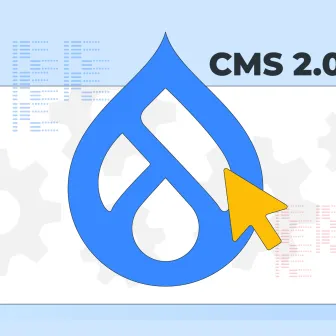“Every blackboard makes student’s life bright”
These lines by former President of India, Dr. APJ Kalam stresses out how important education is. Often the saying goes like ‘the best institutions provide the best education’ and so it comes as no surprise to know how hard it is for every institute in the line to become the ‘Best’. Every presence needs to be perfect. And it’s just impossible to go around without any web presence.
Your first impression is not just your last impression but it can also decide the reputation and crowd for the next batch. Managing any institute’s digital presence and maintaining all the standards across the web is a humongous job.
So who do educational institutes across the world trust? About 28% of all .edu websites worldwide use Drupal. It is the most preferred website platform for hundreds of institutions of higher learning around the world and is used by 7 out of 10 top universities and educational institutions around the world. That makes a convincing argument for rating Drupal as the best platform for higher education websites.

Now the next question in line would be - Why should anyone use Drupal? Following we have brought out some points which would tell you why Drupal is preferred by these top institutes.
-
Easy to Use
The most frequently asked question, regarding anything technical, any layman would want to know first is- Is it easy to use? For Drupal- Yes, it is.
- Editing experience: It has easy to use modules and thus Drupal sites for institutions of higher education provide an editing fast track. Be it any change in event, cancellations, or date reshuffling, everything can be used and managed quickly by any novice, with the use of Drupal. With the existence of various modules (such as CKEditor and Media Management), changes like these can be done easily, saving a lot of time and energy.
- Content and User access control: With Content and User Access Control, site administrators can create new content divided into various roles and functions. These permissions can be assigned to the divided group of users making it less cumbersome. Permissions set to decentralize responsibilities like creating, editing and managing content, help without putting extra workload on one person.
These access control features are exceptionally handy on Drupal based educational websites where various site visitors require unique user experiences and different access rights. The domain access module enables sharing content across multiple sites quite quickly, allowing site owners to share configuration settings and user's information among various college or university portals.
- Huge theme library: For an amazing site which can connect to larger masses it is absolutely necessary that we choose the right theme which makes our website more appealing. Drupal offers easy to use modules with more than 20k themes offering you opportunities to be unique in more ways.
-
Distributions
The multi-site capability helps institutions break out independent websites by giving control and ownership to individual departments. Some Drupal distributions, like Open Atrium, allow you to build intranets for any educational institution.
But can Drupal work in India’s widely distributed geographical land?
Recently released Drupal 8 supports all such features which makes it perfect for the Indian audience. It supports 110 international languages, it is mobile friendly, allows multi-site approach and best for regular edits.
- Language Support: Drupal 8 is now available in over 110 languages. Some of them being Hindi, Telugu, Tamil, Kannada, Malayalam, Odiya, Punjabi among others. Thus, it is easier to connect to larger masses in the language of their preference making any institution an insignia of ‘pan-Indian'. In India’s heterogeneous society which is multilingual, Drupal seems like a perfect answer with its multilingual support system.
- Mobile Friendly: In a country like India where (Android) mobile penetration is increasing with each passing day, it is very important to have mobile compatible websites. Drupal 8 is mobile first. While many CMS promise of being mobile-friendly all they are is just a shrunken version of their web page making things incomprehensible. For such challenges, Drupal 8 has - Drupal Gap.
Drupal Gap is easier to create and customize multi-platform Drupal mobile app that can communicate with the websites. Such applications can be easily installed on almost all mobile devices.
- Multi-site Approach: With Indian institutes now focusing on the overall holistic development of its students, often comes the demand from different departments/student societies for a sister domain. Multisite approach feature helps with this issue also. Multi-site management needs are common for institutions of higher education.
Drupal’s flexibility means effective content storage for each website. Sharing different site content can be done with the Domain Access Module, allowing configuration, user, and content settings to be managed between or across sites.
News of .edu sites being hacked is nothing new. How does Drupal help you with online threats?
-
Security
It is true that .edu sites are more vulnerable to hacking. At times it is a new hacker, among others, it is some student trying to play a prank with authorities. But Drupal has a solution to this too. As it is widely used by many international universities including Harvard University, Stanford University, and Cambridge, we know that Drupal offers them some really good security, one that can barely be breached. Being an Open Source Software, it is generally more secure as it has a community continuously working on updating any vulnerability. Even if someone ever gets stuck with some technical snag, Drupal has large community support which is ready to help you anytime.
Read more about the security modules in our blog 10 Must-Have Security Modules For Your Drupal Website.
Drupal's security team is highly responsive and sends frequent security fixes for all actively maintained versions— all Security Fixes Are Logged.
- Security Working Group: Drupal’s Open-source basics give it a possibility that it is updated frequently with more and better security modules. It’s team ‘Security Working Group’ (SecWG) ensures that Drupal core and Drupal's contributed project ecosystem provides you with world-class security.
- Security Modules: There are a number of security extensions for Drupal to make your content more secure. Even though the core Drupal is secure, the constant threat by brute hackers might make it vulnerable. Thus, it is very important to have a proper testing done.
- Community Support: Drupal being open source platform, has a large community. One can connect with Drupal community groups around the world, and can easily search the issues, queue for questions and answers related to institutes of higher education. Following are some of the groups for higher education institutes:
-
- Drupal Group: Higher Education
- Drupal Group: Drupal In Education
- Drupal Group: Drupal For K-12 Schools
- Drupal Group: Higher Education Europe
- Drupal Group: Open Data In Education
- Drupal Group: ELMS
- Drupal Group: LMS (Learning Management System)
- Stanford Web Services Blog
- Edu Drupal Unconsortium
-
Easier for Announcements/Cases
Every year in eight-column headlines, we see how admissions in India become a pain for both institutions and students. Be it nursery admissions or college, admissions often put the authorities in a tizzy due to a lot of paperwork. How convenient it would be if things were more digital. Wouldn’t it be more sorted for both authorities and students to know everything from their own comfort zone? Filling forms or publishing results of selected candidates through websites, things are easier with Drupal CMS software. With the flexibility, Drupal provides such complex workflows are easy to achieve.
-
Improved Loading Speed
The Fast website is one of the key elements of a good user experience and also site speed is one of the key factors in SEO for organic ranking. Drupal 8 has brought in such architectural changes which makes it more faster.
-
Cost & Licensing
After offering all this Drupal being an Open Software system charges no cost. Unlike its competitors, Drupal doesn’t charge anything for any upgrade plan either. For recent upgrades, you can just download the latest version and it is done. Drupal comes under General Public License and thus one can display, copy, modify, and use Drupal for free of cost. Thus, one can say that with Drupal it is possible to get more and more through less and less.
-
India Trusted
Not just across the globe, Drupal is also trusted by many prestigious Indian Institutes for all the security and services that Drupal provides. Among others, IIT Delhi, IIT Bombay, IIT Kharagpur Alumni, IIM Ahmedabad, ISB Hyderabad are the most prominent. These Indian universities have partnered with Drupal not for its free licensing but for the trust and services that no other CMS provides.
-
Digital India
Lastly, if your institute still doesn’t have any web presence, at least in the name of digital development of your country or as a token of support/appreciation to PM’s call for a “Digital India” you should have one.
Drupal is also used by 7 out of 10 top universities and educational institutions around the world, and trusted by many Indian educational institutes too. This makes a good argument for ranking Drupal as the best platform for education websites. It's the most preferred website platform for hundreds of institutions around the globe. Drupal is loved for its content management framework because it best supports current and future needs of educational websites.
Among all these what is your reason to choose Drupal for your site? Get in touch with us to figure out how Drupal is the right fit in your digital strategy.
Subscribe
Related Blogs
Drupal's Role as an MCP Server: A Practical Guide for Developers

"The MCP provides a universal open standard that allows AI models to access real-world data sources securely without custom…
What’s New in Drupal CMS 2.0: A Complete Overview

"Drupal CMS 2.0 marks a significant change in the construction of Drupal websites, integrating visual site building, AI…
Drupal AI Ecosystem Part 6: ECA Module & Its Integration with AI

Modern Drupal sites demand automation, consistency, and predictable workflows. With Drupal’s ECA module, these capabilities…




